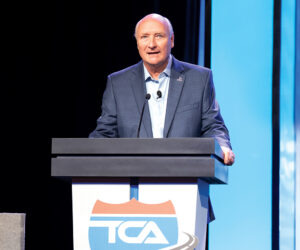BIRMINGHAM, Ala. — When Joe Donald graduated college in 1984, he thought he might be able to spend some time over the next few weeks on the beach and then the ski slopes.
But his grandfather, William Sellers, who owned Baggett Transportation, had other ideas for the young graduate.
“My grandfather gave me seven days off,” Donald, now the company president, said. “I showed up here the day after Labor Day in 1984 and have been here ever since.”
It certainly wasn’t his first foray at the carrier, which is celebrating its 90th anniversary this year.
“I started working here back in the shop during the summer during my high school days back in the late 1970s,” Donald said. “I would change tires, change the oil in the trucks, pull nails out of floors and sweep the trailers.”
Baggett Transportation Co. was founded by Jess Baggett in Birmingham in 1928 as a local carrier hauling dynamite for area coal companies.
In the mid 1930s, Sellers joined Baggett, and acquired a small interest in his company.
Today, Baggett continues to be a family-owned company.
Donald, 56, and in his own words about to turn 57, is the only son of one of Seller’s two daughters and heads the company.
Three cousins — David Crommelin, Claiborne Crommelin and Charles Crommelin, are active in the company, head up safety, pricing and operations.
Sellers passed away in July 1990 “in the office where I’m sitting,” Donald said.
Donald’s father had chosen medicine over trucking, and the younger Donald wasn’t quite ready for the presidency when his grandfather passed away.
“We had a man whose name was Robert Nunnally,” Donald said. “He was our accountant and ran the accounting department for my mother and my aunt until they felt I was ready to step into an executive role,” which occurred in the late 1990s.
His mother is still living, although not involved in the company. His aunt is deceased.
Although the company had long hauled for the Department of Defense, the events of September 11, 2001, required Baggett to enter into a different business model.
“Over the years, we had progressed to doing more and more for the Department of Defense with our team drivers, but 9/11 literally changed the way we did business,” Donald said. “We could no longer have terminals storing sensitive items and we had to go directly from shipper to consignee with no stopping. Everything was now monitored by satellite and other communications equipment.”
Hauling for DOD is quite different from hauling general commodities.
The security level for hauling government goods is intense.
There are satellites on the tractor and the closed vans and trailers and the government work requires teams because trucks cannot stop for more than two consecutive hours.
“You are monitored all the time by the government,” Donald said.
Today, some 50 percent of Baggett’s business comes from DOD.
Sixty percent of its some 100 tractors are driven by teams, and sometimes team drivers are hard to find.
“We do better hiring someone who’s been in this business before,” Donald said. “If it’s a team from a general commodity [hauler], they are used to running a bunch of miles. Transporting Department of Defense commodities is about what you can earn with less miles because with the government, a lot of bases are only open four days a week, 10 hours a day. So, you don’t have a lot of Friday work. Sometimes these team drivers can adjust, sometimes they can’t. The rate of pay is better, but they are not going to get the 5,000 miles a week going from base to base for the U.S. government.”
In addition to mileage pay, team drivers hauling for the DOD are paid a percentage of the gross revenue of the load they are hauling.
Prospective team drivers are carefully scrutinized and so are some staff.
“They check them out pretty good,” he said. “Also, any of our staff who knows anything about the shipments must be cleared through the Department of Defense.”
Donald strives to maintain a family oriented culture at Baggett right down to the dress code.
“When I started here, it was coat and tie for men, dresses for women,” he said. “We’ve become a lot more casual because I thought a coat and tie might be intimidating when you were talking to drivers, so now we wear khakis with a collared shirt and we allow jeans on Fridays. We have a younger-aged staff.
When I came here 33 years ago, everyone was my elder and now I’m one of the older ones here. We have a lot of young, energetic employees who want to be successful.”
Today, the company is prospering.
Donald is hoping to strengthen Baggett’s non-DOD business, which he says “comes and goes.”
He’s hopeful revenue will top $40 million in sales this year.
Donald credits the success of Baggett to comradery within the company.
“We’re people persons,” Donald said. “We all enjoy working with one another. Now, I’m not going to say we haven’t had our arguments, but we all get along together.” 8
Lyndon Finney’s publishing career spans over 55 years beginning with a reporter position with the Southwest Times Record in Fort Smith, Arkansas, in 1965. Since then he’s been a newspaper editor at the Southwest Times Record, served five years as assistant managing editor of the Arkansas Democrat-Gazette in Little Rock and from November 2004 through December 2019 served as editor of The Trucker. Between newspaper jobs he spent 14 years as director of communications at Baptist Health, Arkansas’ largest healthcare system. In addition to his publishing career he served for 46 years as organist at Little Rock’s largest Baptist church.








I saw your add for owner operators , Do you have a lease program?
Robert Nunnally was the worst boss I have ever had.. He was condescending and treated people horribly. i am a boss now and I learned everything Not to do in my 20s when I worked for this dictator.